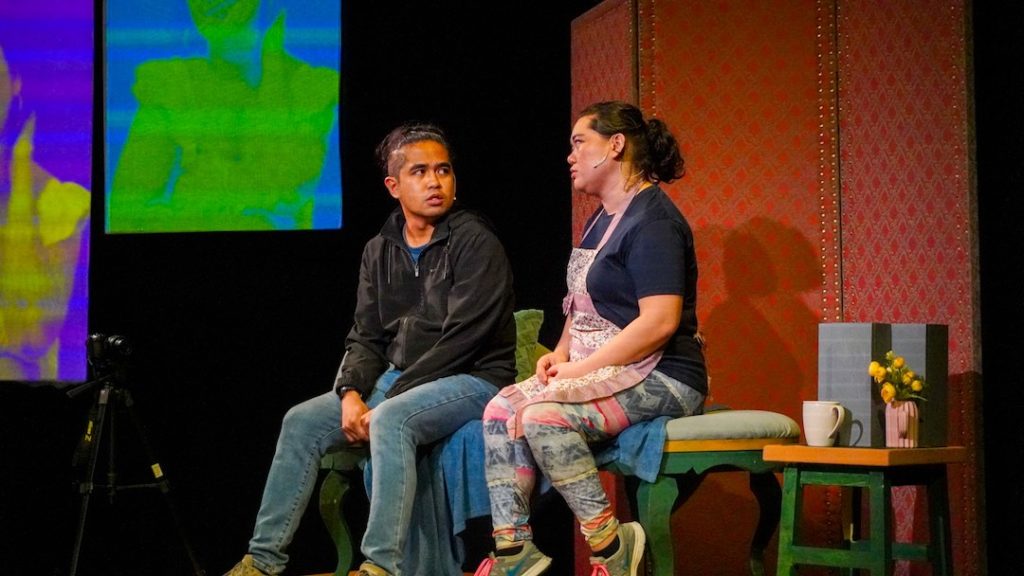PETA kicks off 2024 by unveiling a remarkable collection of eight new works that intricately focus on the theme of narrative transformation under the banner of CONTROL+SHIFT: Changing Narratives, Reclaiming and Reshaping Stories of the Filipino People. Having had the privilege of witnessing six of these performances, I personally experienced PETA’s brilliant use of theater as a tool to reclaim and reshape the narratives that define the Filipino people.
For CONTROL+SHIFT Set C, I was able to watch Kyle Saldonido’s “Pilipinas, Geym Ka Na Ba?”, Glecy Atienza’s “Nakatala Sa Tubig”, and Zoe Damag, Julia Enriquez, Pia Viola, and Gold Villar-Lim’s “Momsilogues”.

Pilipinas, Geym Ka Na Ba?
“Pilipinas, Geym Ka Na Ba?” presented by Umalohokan, Inc., offers a thought-provoking exploration of a familiar theme—the plight of individuals trapped in a mysterious setting, forced to navigate through twisted childhood games with dark twists to secure their freedom. Under the direction of Kovi Billones and the guidance of Ian Segarra, the play unfolds in Barangay Pinapili, where the residents awaken in an obscure playground, their escape contingent on successfully conquering a series of sinister games.
The play dives into a web of deception, unexplained disappearances, and the stark reality that the games played are a matter of life and death. The thematic resonance with the Drug War Killings in the Philippines adds layers of societal critique, as the audience is prompted to question who truly wins and loses in this harrowing game.

Despite the commonality of the theme, “Pilipinas, Geym Ka Na Ba?” manages to engage through its execution. The direction, writing, and acting contribute to a performance that, while not groundbreaking, is at least satisfactory. However, in presenting a theme that has already been explored in various forms, this urges the audience to seek excellence in other aspects of the production.
The narrative, which circles around corruption, drugs, and government abuse, aligns with the broader theme of Control+Shift’s exploration of changing narratives. Yet, the play falls short of being truly exceptional due to its adherence to well-trodden paths within this overarching theme. A more nuanced exploration, focusing on the narratives of addicts or delving into the context of corruption and abuse, might have better aligned with the theme of Control+Shift.
Nakatala Sa Tubig
For “Nakatala Sa Tubig”, a staged reading which focuses on water and the lives and roles of women in times of war, the acting was simply put, superb.
The simple logline suggests a narrative of depth and significance, and the play lives up to this promise. Glecy Atienza’s solo performance (backed by dancers, Jenelyn Malunes and Ernest Gillacanao) takes center stage, and her acting prowess shines through, delivering a stellar portrayal that captures the nuances of the narratives. Atienza’s exceptional storytelling skills and stage presence drives this performance.

Acknowledging the play’s extended duration and the potential language barrier for casual viewers less familiar with Tagalog, I however applaud the bold move of presenting a staged reading of such length. This boldness pays off, and Glecy Atienza’s compelling performance compensates for any perceived lengthiness or language challenges. The emphasis on exceptional acting as a key factor in the success of a staged reading is particularly relevant here, and Atienza’s skillful delivery elevates the overall experience.
The sound design by J Laspuna is also a significant contributor to the immersive quality of the performance. The effective sound design successfully immerses the audience in the stories being told, which creates an engaging and memorable experience.
Momsilogues
“Momsilogues,” directed by Gold Villar-Lim, unfolds as the crowning jewel of Set C, and the adage “save the best for last” rings particularly true in this exceptional performance. From direction to writing, and most notably, acting, Zoe Damag, Julia Enriquez, Pia Viola, and Gold Villar-Lim’s collaboration showcases an outstanding exploration of the challenges faced by single moms in the play’s savory journey through career, love, and motherhood.

The trio of actresses (Julia Enriquez, Pia Viola, and Kitsi Pagaspas) delivers performances that transcend the stage, delving deep into the complexities of single motherhood. The monologues presented by each actress are powerful narratives that shed light on the multifaceted struggles of raising children, juggling careers, and maintaining sanity and self-worth. What sets “Momsilogues” apart is its raw and unfiltered perspective, offering an eye-opening and heartwarming portrayal of the humanity behind the superheroic image often attributed to moms, especially single moms.
A standout element of the play is Kitsi Pagaspas’ lustrous performance. Initially portraying a seemingly stereotypical comedic character, the wife turned mother-in-law caretaker, Pagaspas skillfully navigates the comedic aspects with flawless timing, eliciting genuine laughter from the audience. However, her character takes an unexpected turn, revealing depth and complexity. And It is in this transition that Pagaspas’ versatility truly shines. Her ability to seamlessly shift from humor to poignant moments showcased her remarkable gift.
The narrative, while encapsulating the human experience of motherhood, also breaks away from conventional stereotypes, offering a fresh and authentic perspective on the struggles faced by single moms. The story, while relatable and heartwarming, goes beyond the expected, providing a nuanced portrayal that resonates with the audience.
The next CONTROL+SHIFT set I was able to watch was Set B, which also had promising shows: Dominique La Victoria’s “Kislap at Fuego,” directed by Maribel Legarda and J-mee Katanyag, Liza Magtoto’s “/” (Slash), directed by Meann Espinosa, and “Ang Parangal,” directed & conceptualized by Eric dela Cruz, and adapted and co-conceptualized with Michelle Ngu-Nario.
After an amazing first set, my expectations for this set were high. And this set definitely did not disappoint.
Kislap at Fuego
It started off very strong, with Kislap at Fuego. Derived from the adaptation of Vida Cruz’s “Odd and Ugly” in “Toward The Fires of Revolution,” this performance unfolds a captivating narrative set in 1896 during the Philippine revolution against Spain. Crafted by Playwright Dominique La Victoria and skillfully translated into Filipino by Gentle Mapagu, the play wonderfully navigates the realms of enchantment and historical upheaval.
Directed by Maribel Legarda and J-mee Katanyag, “Kislap at Fuego” introduces audiences to an enchanted forest, where a Kapre, portrayed by the talented Jerald Napoles, encounters a mysterious country girl, brought to life by the enchanting Kim Molina. The narrative takes an unexpected turn as sparks and santelmos ignite, weaving a fairytale that catches the Guardia Sibil off guard.

The ingenious production extends beyond the compelling storyline. It is said that constraints breed creativity; and considering how small and limited the space was, special praise must be made on Boni Juan’s meticulous Production Design, which brought the enchanted forest to life, creating a visual feast for the audience. Luis Sumilong’s Lights Design also enhances the magical ambiance, while Kabaitan Bautista’s Music and Sound Design enrich the overall sensory experience.
The cast, led by Kim Molina as Diwata and Jerald Napoles as The Kapre, delivers superlative performances that bring depth and emotion to their characters. The chemistry of the real-life couple adds authenticity to the unfolding fairytale, capturing the essence of love amidst the backdrop of revolution.
“Kislap at Fuego” successfully employs the fairytale narrative device to reshape conversations about love, rebirth, and revolution. It masterfully merged elements of fantasy and history, creating a unique and thought-provoking theatrical experience.

/ (Slash)
The next performance would be Liza Magtoto’s thought-provoking play, “/ (Slash),” directed by Meann Espinosa. Slash delves into the complexities of cancel culture through the lens of an influencer faced with a moral dilemma. The narrative revolves around Xendy, portrayed by Yeyin Dela Cruz, whose loyalty, sense of righteousness, and personal branding are put to the test when her best friend, Reeves, played by Ian Segarra, faces accusations of sexual harassment.
The premise is timely and relevant, exploring the consequences of cancel culture on personal relationships and professional standing. Yeyin Dela Cruz delivers a commendable performance as Xendy, portraying the inner conflicts and emotional struggles of a character caught between loyalty and the need to take a stand.
However, despite the strong thematic foundation, the overall impact of the play is hindered by sub-par acting. The authenticity and emotional depth, particularly in Ian Segarra’s portrayal of Reeves, feel lacking. The audience may find it challenging to connect with the characters on a deeper level, as the performances come across as somewhat artificial.
Additionally, the play’s thematic focus on the concept of “slash” may contribute to the perceived lack of direction. While an open-ended story can be intriguing, “/ (Slash)” leaves the audience wanting for a more defined narrative arc. The central theme of cancel culture, coupled with the play’s title, might have worked with a better crafted story, or more threshed out characters, or maybe simply with better acting, but overall, the sense of ambiguity just made it difficult for the audience to discern the intended direction of the story.
Despite these shortcomings however, the play raises important questions about the nuances of cancel culture and the challenges individuals face when trying to navigate its complexities. It invites reflection on the impact of social media judgments on personal and professional relationships.
Ang Parangal
This set’s final show is “Ang Parangal”, a hilarious satire on incompetence and good intentions. Directed and conceptually crafted by Eric V. Dela Cruz, with adaptation and co-conceptualization by Michelle Ngu-Nario, “Ang Parangal” emerges as a side-splitting tribute, taking an unexpected turn as it satirically adapts Miloš Forman’s film, “The Fireman’s Ball.” The play unfolds within the chaotic and uproarious world of barangay tanods, excellently portrayed by Roi Calilong, Gie Onida, Jack Yabut, and Raffy Tejada.
Styze Genodia’s Production Design sets the stage for a series of mishaps, missed raffle prizes, and a beauty pageant gone awry. The narrative raises the question: Can spectacles and good intentions compensate for incompetence? The answer unfolds through the misadventures of the barangay tanods, whose well-meaning efforts lead to a cascade of comedic incidents.

Among the cast, special mention must be made of Roi Calilong and Raffy Tejada, whose performances inject an extra dose of genuine humor into the production. Their comedic timing and delivery enhance the overall enjoyment of the play, leaving the audience in stitches.
“Ang Parangal” excels not only in its performances but also in its interactive and comedic elements. The play invites the audience to participate in the hilarity, creating an immersive experience that keeps the laughter flowing from start to finish. The concept creatively explores the consequences of ineptitude in a community setting, where everyone becomes a victim of their own well-intentioned but misguided actions.
The play serves as a reminder that, in a world where incompetence prevails, the line between hilarity and chaos is thin, and everyone becomes a participant in the absurdity.
The artistic prowess of PETA artists, coupled with the collaboration of creative partners, shines through in this collection. The lineup promised a diverse array of narratives, each aimed at provoking curiosity, sparking conversations, challenging assumptions, and transforming toxic narratives and harmful depictions that impede societal progress–and this promise it delivered.
What makes CONTROL + SHIFT particularly compelling is its intention to use theater as a powerful platform for reclaiming spaces dedicated to collective meaning-making and social transformation. The recognition that changing the world can commence with the experimental exploration of a story, a frame, or a narrative is clearly at the heart of PETA’s mission with this collection.
The invitation extended by PETA to join and witness these empowering stories coming to life is a call to engage with the transformative potential of live theater. By attending these performances, audiences have the opportunity to be a part of a collective experience that goes beyond mere entertainment. PETA’s commitment to pushing boundaries and exploring new frontiers is evident in this collection, which serves as a testament to the organization’s role in shaping the cultural landscape.
Click here for more stories like “CONTROL+SHIFT”. You may also follow and subscribe to our social media accounts: Facebook, YouTube, Instagram, TikTok, Twitter, and Kumu.






















